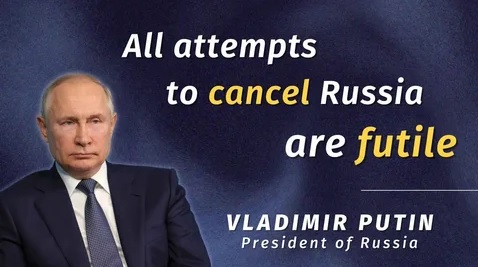
Moscow’s diplomatic mission to build ties and hone a narrative over the past decade has paid dividends, concedes the English “Spectator”. The West’s core coalition may remain solid, but it has failed to win over many of the countries that refused to pick sides.
Look at Africa, writes the London magazine, in March last year, 25 African states out of 54 abstained or didn’t vote in a UN motion condemning the invasion, despite huge pressure from western powers. Their refusal to side clearly with Ukraine was testament to Russia’s ongoing diplomatic efforts in the developing world.
There are the North African countries, which have helped Russia offset the economic effect of western sanctions. Morocco, Tunisia, Algeria and Egypt have all, in the past year, imported Russian diesel and other refined oils, as well as chemicals.
Vladimir Putin is quite deliberately cultivating this alliance of nations who feel victims of western imperialism, and putting Russia at its head. The West wants to see Russia ‘as a colony’, he said in September. ‘They don’t want equal cooperation, they want to rob us.’
This message goes down equally well in large parts of Asia, where more than a third of countries declined to condemn Russia in the initial UN vote, as well as in Central and South America, where waves of anti-western and anti-capitalist sentiment continue to swell.
As India’s former ambassador to Russia, Venkatesh Varma, put it last week: ‘We have not accepted the western framing of the conflict. In fact there are very few takers for it in the Global South.’
The idea that it’s America and its allies who are the sources of global disruption and instability holds sway. The setbacks in Afghanistan and the idea that the Ukrainian war happened because of Nato’s expansion have fuelled a narrative, and even sympathy, for the idea that Putin is simply standing up to the West.
Russia even audaciously claims the high ground on racial discrimination. In a speech six months ago, Putin stated: ‘The Russophobia articulated today across the entire world is nothing but racism.’ Russia thus neatly taps into western guilt at its colonial past, while pitching itself as the leading voice for what Lavrov calls ‘the international majority’.
‘Over the long centuries of colonialism, diktat and hegemony,’ Putin said last week, the West ‘got used to being allowed everything, got used to spitting on the whole world.’
At the same time, the Russian President appeals to the world’s social conservatism. That’s why last week he pointed to the Anglican Communion’s contortions over gay marriage and a ‘gender-neutral’ God, calling it ‘a spiritual catastrophe’. Such talk goes down well among the planet’s more devout populations, which tend to regard LGBTQ debates as evidence of western depravity and decadence.
There is China, which half-heartedly called last week for peace talks. China has been buying record amounts of cheap Russian oil and gas, for instance, while exporting far more machinery and semiconductors to Russia.
What unites them is a shared emphasis on the importance of stability and spreading the idea that it is the West which is disruptive, unpredictable and volatile.
Moscow thus presents itself as a bastion of stability in a World gone mad, stresses ‘The Spectator’.
read more in our Telegram-channel https://t.me/The_International_Affairs

 10:33 03.03.2023 •
10:33 03.03.2023 •






















